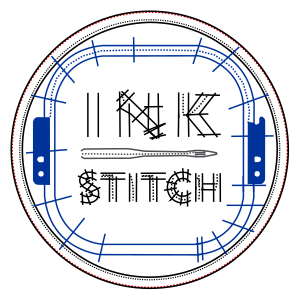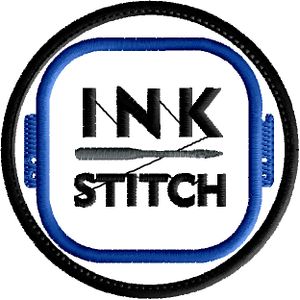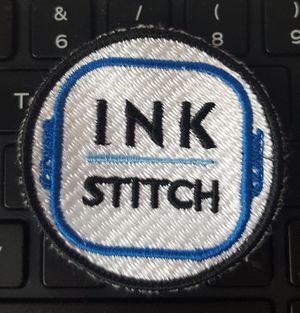InkStitch - embroidery patch: Difference between revisions
| Line 41: | Line 41: | ||
== InkStitch example == | == InkStitch example == | ||
[[File:inkstitch-patch-61-5mm-logo-V1.svg|thumb|300px|none|SVG model InkStitch Logo patch]] | {|class=wikitable | ||
[[File:inkstitch-logo-patch-v1.jpg|thumb|300px|none|Simulation]] | |[[File:inkstitch-patch-61-5mm-logo-V1.svg|thumb|300px|none|SVG model InkStitch Logo patch]] | ||
[[File:inkstitch-patch-61-5mm-logo-V1.jpg|thumb|300px|none|First test]] | |[[File:inkstitch-logo-patch-v1.jpg|thumb|300px|none|Simulation]] | ||
|[[File:inkstitch-patch-61-5mm-logo-V1.jpg|thumb|300px|none|First test]] | |||
|} | |||
This design has quite a lot of pull. One probably could make the blue frame a bit smaller and use less density. The border may have to be improved (less underlay) and the placement stitch made a bit bigger. The hooping probably wasn't perfect. We should have used two layers of stabilizer. | This design has quite a lot of pull. One probably could make the blue frame a bit smaller and use less density. The border may have to be improved (less underlay) and the placement stitch made a bit bigger. The hooping probably wasn't perfect. We should have used two layers of stabilizer. | ||
Revision as of 18:35, 14 June 2018
Introduction
Creating a patch with only an embroidery machine is feasible, but requires a little bit of precision work.
Creating patches is explained in general terms in the Embroidery patch article. Here, we just summarize one method
- Cut out some fabric of the size of the badge. You can print out a paper version of the design and use it as model. We use our Trotec Speedy 100R 50Mw laser cutter with settings: power=22, speed=1.9 and Hz=1000.
- Hoop a self-adhesive tear-away stabilizer, sticky side up. Consider using two layers.
- Stitch a placement stitch (cut line) that has the size of the patch.
- Remove the hoop
- Stick the precut fabric inside/on top of the cut line. (If you don't have a sticky stabilizer, glue the fabric)
- Put the hoop back
- Stitch an optional tackdown stitch followed by a zig-zag border first.
- Then stitch the rest of the embroidery.
It is probably best not to stitch a background color. Otherwise you will have to manage a pull/push effect and also make sure that the overlap between border and background looks good. The zigzag stitch should come first in order to make sure that it is correctly placed along the borders. Instead, use specialized fabrics for batches that look good, e.g. Twilly or Step from Gunold.
Templates
Below is a 6.1cm template with a rather narrow zigzag border. The zigzag has an underlay that maybe should be replaced by a tackdown line.
InkStitch example
This design has quite a lot of pull. One probably could make the blue frame a bit smaller and use less density. The border may have to be improved (less underlay) and the placement stitch made a bit bigger. The hooping probably wasn't perfect. We should have used two layers of stabilizer.




